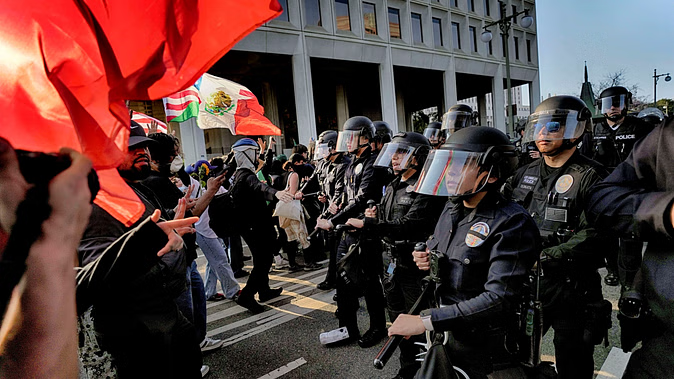5000 Soldiers Deployed in Los Angeles: California Governor Accuses Trump of Military Trap, Calls It an Assault on Democracy
In an escalating political and social crisis, U.S. President Donald Trump has ordered the deployment of approximately 5,000 military personnel to Los Angeles, California, including members of the National Guard and the U.S. Marines. The decision has sparked intense controversy, with California Governor Gavin Newsom openly condemning the move as a strategic military trap and a direct threat to American democracy.
A President’s Military Action Sparks Outrage
The deployment comes amidst growing unrest and widespread protests across Los Angeles. While the Trump administration insists the move is essential to restore order and security, critics argue it represents a dangerous overreach of federal authority. Governor Newsom, a Democrat and vocal opponent of many Trump-era policies, claims this military intervention is not only unconstitutional but also an alarming attempt to suppress civil liberties under the guise of national security.
“President Trump is laying a military trap,” Newsom stated during a press conference on Tuesday. “This is not about protecting citizens—it’s about projecting power, and it poses a serious danger to our democratic values.”
Targeting Vulnerable Populations: Beyond Criminals
Governor Newsom further highlighted concerns regarding the targeting of immigrants and working-class individuals under the guise of maintaining law and order. According to Newsom, federal and military personnel have not only detained those with criminal records but have also apprehended innocent, hardworking individuals such as dishwashers, gardeners, tailors, and daily wage laborers.
“These are not criminals; these are contributing members of our community,” said the Governor. “We are seeing an unjust crackdown on people who do not pose any threat but are instead being treated as scapegoats in a larger political game.”
No State Consent: A Warning to Other Governors?
Newsom’s disapproval stems not only from ethical objections but also from the lack of consultation or consent before the deployment. He revealed that the state government of California was neither informed nor involved in the decision-making process. According to him, this unilateral action by the Trump administration is a warning sign for other state leaders who may also be subjected to federal military intervention without prior agreement.
“This sets a terrifying precedent,” Newsom warned. “If the federal government can impose military force in our cities without state coordination, it threatens the very foundation of state autonomy enshrined in the Constitution.”
Legal Action: Governor Moves to Court
The escalating tension has prompted legal action. Governor Newsom has taken the issue to court, arguing that the use of federal troops for immigration and public order enforcement violates constitutional limits and civil rights. In his filing, he stated that such military involvement could escalate tensions rather than resolve them, particularly in a state as diverse and densely populated as California.
“Deploying military forces for law enforcement purposes, especially in immigrant communities, is inappropriate and dangerous,” Newsom said. “This is not just a policy dispute; it’s a legal battle to preserve our democratic rights.”
Trump’s Justification: “Law and Order”
President Trump, however, has defended his decision, stating that his actions are necessary to curb what he called a rising tide of violence and chaos in Los Angeles. In the past four days, the city has witnessed protests, some of which turned violent, prompting Trump to authorize additional federal assistance.
“We cannot allow our cities to burn,” the President declared. “We will not stand by while lawless mobs take over American streets.”
However, Los Angeles Mayor Karen Bass, along with Newsom, has publicly disputed Trump’s narrative. Both leaders have claimed that local authorities were handling the situation effectively and that military involvement was not required and even harmful.
Law Enforcement Pushes Back
Adding to the dispute, local police departments have also voiced discomfort with the deployment. Several law enforcement officials have said they were neither consulted nor supportive of the measure. They emphasized that the situation, though serious, was under control and that bringing in federal troops risked inflaming tensions further.
“Our officers are already coordinating with state and local agencies,” one LAPD official commented. “The presence of soldiers only complicates our efforts to de-escalate tensions and maintain trust within our communities.”
Democracy Under Pressure
The conflict highlights a broader and more troubling issue—the erosion of democratic norms and the balance of power between federal and state governments. Many political analysts view this incident as a test of America’s commitment to its democratic foundations, where federal authority is meant to complement—not override—state autonomy.
“This is not just about California,” said a political science professor at UCLA. “This is about the fundamental relationship between the states and the federal government. What’s happening in Los Angeles could very well become the template for other federal interventions if left unchallenged.”
A Nation Watching Closely
As the situation unfolds, the nation—and indeed the world—watches closely. The deployment of thousands of soldiers in one of America’s largest and most diverse cities has created a moment of reckoning for leaders, lawmakers, and citizens alike.
Governor Newsom concluded with a sobering message: “We must remain vigilant. Democracy is not self-sustaining—it requires courage, resistance, and accountability. We will not stand by and allow our state’s sovereignty and our people’s rights to be undermined.”
